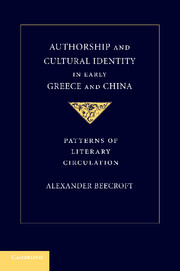Book contents
- Frontmatter
- Contents
- Acknowledgments
- Introduction
- 1 Explicit Poetics in Greece and China: Points of Divergence and Convergence
- 2 Epic Authorship: The Lives of Homer, Textuality, and Panhellenism
- 3 Lyric Authorship: Poetry, Genre, and the Polis
- 4 Authorship between Epic and Lyric: Stesichorus, the Palinode, and Performance
- 5 Death and Lingerie: Cosmopolitan and Panhuaxia Readings of the Airs of the States
- 6 Summit at Fei: The Poetics of Diplomacy in the Zuozhuan
- 7 The Politics of Dancing: The Great King Wu Dance and the Hymns of Zhou
- Conclusion: Scenes of Authorship and Master-Narratives
- Bibliography
- Index of Passages Cited
- General Index
7 - The Politics of Dancing: The Great King Wu Dance and the Hymns of Zhou
Published online by Cambridge University Press: 03 May 2010
- Frontmatter
- Contents
- Acknowledgments
- Introduction
- 1 Explicit Poetics in Greece and China: Points of Divergence and Convergence
- 2 Epic Authorship: The Lives of Homer, Textuality, and Panhellenism
- 3 Lyric Authorship: Poetry, Genre, and the Polis
- 4 Authorship between Epic and Lyric: Stesichorus, the Palinode, and Performance
- 5 Death and Lingerie: Cosmopolitan and Panhuaxia Readings of the Airs of the States
- 6 Summit at Fei: The Poetics of Diplomacy in the Zuozhuan
- 7 The Politics of Dancing: The Great King Wu Dance and the Hymns of Zhou
- Conclusion: Scenes of Authorship and Master-Narratives
- Bibliography
- Index of Passages Cited
- General Index
Summary
In the final chapter, I turn to the final section of the Songs, the Hymns. The subject matter of the Hymns, like that of the Court Songs, is largely drawn from the predynastic and foundational years of the Zhou. Some of the poems constitute what one scholar has titled the Weniad, a quasi-epic recitation of the events of the life of King Wen; others deal with events earlier or later than Wen's reign. In all cases, these narrative poems have generally received less attention in Western studies of the Canon of Songs, in large part perhaps because their lesser degree of strangeness from a Eurocentric perspective makes them less interesting to accounts of Otherness.
More surprising, perhaps, is that even the Mao tradition itself is by implication less interested in these poems; the poetics developed by the Preface seems clearly designed to account for the Airs, but accounts badly for the other poems (how, exactly, are we to imagine ritual hymns and narrative poems about charter-myths of the dynasty as the spontaneous overflowing of popular emotion?). This lack of interest in the Court Songs and Hymns may be explained by the fact that, because these texts are explicitly ideological in function, there is little need to construct a reading strategy that will allow one to find implicit political content within them. A significant section of the Songs seem to have been performed as quite explicitly mimetic (at least in the pre-Platonic sense) dances.
- Type
- Chapter
- Information
- Authorship and Cultural Identity in Early Greece and ChinaPatterns of Literary Circulation, pp. 240 - 277Publisher: Cambridge University PressPrint publication year: 2010



